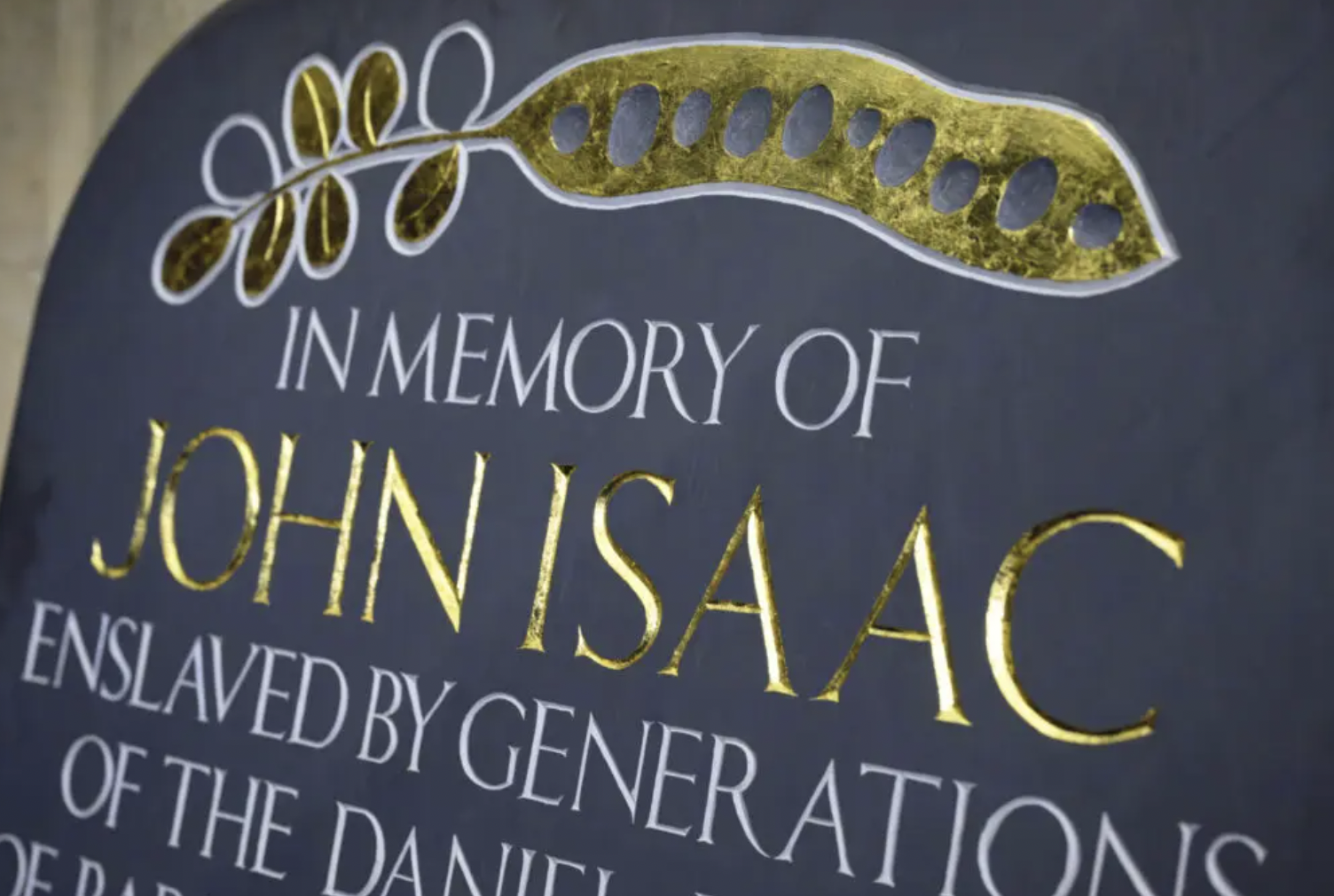On Wednesday 9th October, Bristol Cathedral will unveil a new memorial dedicated to John Isaac, a man born into chattel slavery on a plantation owned by Thomas Daniel (1762-1854). While there are several monuments within the Cathedral honouring the Daniel family, this new memorial is the first to recognise and honour the lives of those enslaved by them.

The plaque, which will be installed beneath the Rose Window at the west end of the Cathedral, pays tribute to John Isaac and acknowledges the lives of at least 4,424 African and Caribbean individuals who were enslaved and exploited by the Daniel family. The Daniel family not only profited from the sugar trade, money lending, and banking but also claimed financial compensation from the British government under the Abolition Act of 1833. This Rose Window, under which the new memorial will be placed, was originally raised in honour of Thomas Daniel III and his wife, Augusta Louisa Daniel (née Bridges), both of whom benefitted greatly from the economy built on slavery over two centuries.
This significant new memorial plaque has been commissioned by TTEACH Plaques and meticulously crafted from Welsh Blue Slate by sculptor and stonemason Marcia Bennet-Male. It represents the culmination of 4.5 years of advocacy, led by Gloria Daniel, the founder of TTEACH Plaques, with support from her father Uriel and uncle Hallam, who are John Isaac’s great-grandsons. Their dedication highlights how closely intertwined this history remains with the present, and how its effects continue to resonate through generations. This memorial also builds on decades of advocacy by many individuals working towards reparative justice.
The unveiling of this plaque is more than just a symbolic act; it is a significant step in confronting the erased and forgotten histories of those who suffered under the horrors of slavery. By honouring John Isaac, we honour all those forcibly trafficked and enslaved, ensuring their stories and legacies are remembered and acknowledged.
Gloria Daniel, founder TTEACH Plaques and the great-great granddaughter of John Isaac, said:
“The memorial highlights the historical ties imposed upon our ancestors. While global conversations about reparative justice continue, this memorial provides a concrete gesture of acknowledgement and respect. It underscores the vital role descendants of enslaved people have in leading the efforts for reparative justice.”
The Very Revd Dr Mandy Ford, Dean of Bristol, spoke about the impact of this new addition to the Cathedral, reflecting on its role in addressing the legacy of transatlantic slavery and its importance in the healing process for both individuals and communities.
The Very Revd Dr Mandy Ford, said:
“The unveiling of this corrective memorial is an important catalyst in healing relationships between human beings as we come to terms together with the impact of transatlantic chattel slavery on our histories and lives. I am deeply grateful to Gloria Daniel for her willingness to assist us in our learning and for this beautiful, truthful and challenging addition to the fabric of the building.”
The permanent memorial will be unveiled at a private event on the 9th of October 2024 and will be available for public viewing from Wednesday, 10th October 2024 onwards, during the Cathedral’s opening hours.
For those interested in learning more about Bristol Cathedral’s connection to the transatlantic slave trade, the All God’s Children exhibition provides further insight into these historical links.
Reflecting on the Church's Commitment to Racial Justice
The unveiling of this memorial ties directly into the Church of England’s wider commitment to addressing institutional racism. As a Church, we must continue to challenge and dismantle the structures of inequality that still exist within our communities. By listening to and learning from the experiences of Black, Asian, and Global Majority Heritage people, we can begin the necessary process of cultural change.
This memorial serves as a powerful reminder of the need for ongoing reflection and action. It is not enough to acknowledge the past; we must also ensure our churches become spaces where all voices are heard, respected, and represented. Recruiting more GMH clergy, staff, and volunteers remains a priority, as does creating an environment where everyone feels welcome and valued. Through persistent commitment, we can drive the change needed to build a more inclusive and just Church.